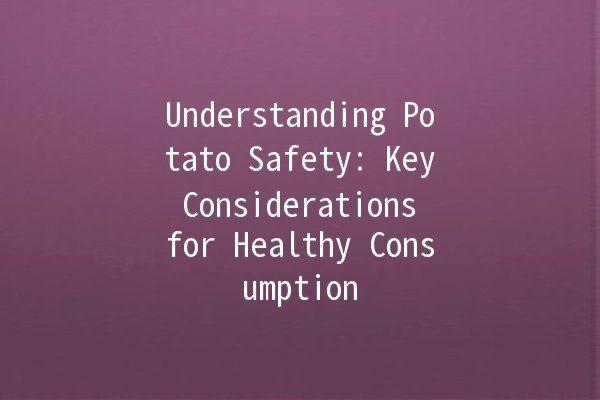Potatoes are a staple food in many cultures, celebrated for their versatility and taste. However, ensuring their safety for consumption is crucial. This article delves into the various aspects of potato safety, including handling, storage, preparation methods, and cooking techniques. We'll also explore five practical tips to enhance your productivity in ensuring potato safety and reducing food waste while providing a satisfying eating experience.
The Importance of Potato Safety
The significance of potato safety cannot be overstated. Contaminated potatoes can lead to foodborne illnesses, which can pose serious health risks. Proper handling, storage, and cooking are essential steps in ensuring that the potatoes you serve are both delicious and safe.
Potatoes, when improperly stored or cooked, can harbor toxins and bacteria. Understanding how to select and prepare potatoes safely can make a substantial difference in your overall health and wellbeing.
Choosing the Right Potatoes

When shopping for potatoes, look for ones that are firm and free of blemishes or sprouts. Avoid any that feel soft or have a greenish tint, as these can indicate the presence of solanine, a natural toxin produced by the potato plant.
Store your potatoes in a cool, dark place, such as a pantry or basement, away from light exposure. Light can lead to greening, which increases solanine levels. A temperature range of 45 to 50°F (7 to 10°C) is ideal for storage.
Tip for Productivity: Create a dedicated storage area for your potatoes, labeled and organized, to keep track of expiration dates and prevent spoilage.
Proper Handling Techniques
Before cooking, it's essential to wash potatoes thoroughly under running water. This removes dirt, pesticides, and potential bacteria that may be present on the skin. Use a vegetable brush for added cleanliness.
The skin of the potato contains many nutrients, so consider leaving it on when preparing dishes like mashed potatoes or roasted potatoes. However, if you notice any green patches or blemishes, those areas should be peeled away or the potato should be discarded.
When preparing potatoes, ensure that cutting boards, utensils, and surfaces are clean. Use separate cutting boards for vegetables and meats to prevent crosscontamination.
Tip for Productivity: Schedule a weekly meal prep session to wash and cut potatoes. This way, you can store prepped potatoes in the fridge for easy access throughout the week.
Cooking Potatoes Safely
Cooking potatoes to a temperature of at least 165°F (74°C) ensures that any harmful bacteria or toxins are destroyed. You can boil, bake, fry, or steam potatoes according to your preference, but always ensure they are cooked all the way through.
If you have leftover cooked potatoes, be sure to refrigerate them within two hours of cooking. They should be consumed or discarded within three to five days. Reheat leftovers to a minimum of 165°F (74°C) before eating.
Tip for Productivity: Use a food thermometer to check the internal temperature of your potatoes easily, ensuring they are cooked to the correct level.
FAQs about Potato Safety
Sprouted potatoes should be avoided, as they can contain elevated levels of solanine. If a potato has sprouted, it is advisable to discard it rather than trying to salvage it.
Signs of spoilage include softness, a foul odor, or extensive greening. If any of these signs are present, it's best to discard the potato.
Refrigerating potatoes is not recommended, as it can lead to a change in flavor and texture. Instead, store them in a cool, dark place.
Yes, potato skin is nutritious, but ensure it is thoroughly washed to remove any harmful residues or dirt. Discard any green areas or blemishes before consuming.
If you consume a small amount of a green potato, it may not cause harm, but monitor for any symptoms of solanine poisoning, such as nausea, vomiting, or stomach cramps. Consult a healthcare professional if symptoms occur.
Consider healthy cooking methods such as baking or steaming rather than frying. Also, use spices and herbs to enhance flavor without adding excessive calories or fats.
Quick of Key Points
Choose quality potatoes that are firm and blemishfree.
Store potatoes in a cool, dark place.
Wash and prepare potatoes properly to avoid contamination.
Cook thoroughly and refrigerate leftovers promptly.
By following these guidelines and tips, you can enhance potato safety in your kitchen and enjoy this nutritious food without worry. Embrace the joy of cooking potatoes while keeping health and safety at the forefront of your culinary endeavors! 🍽️🥔